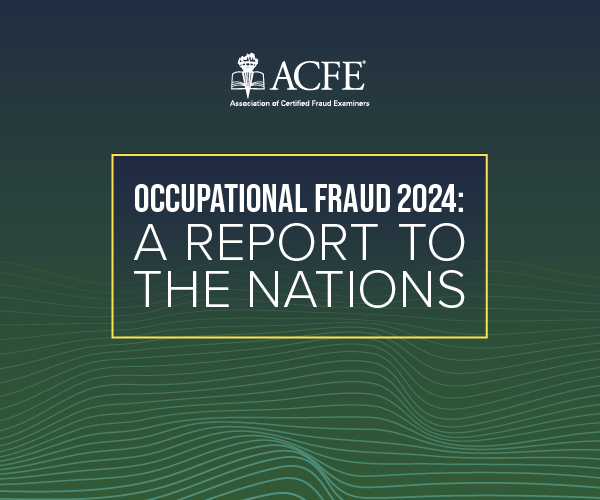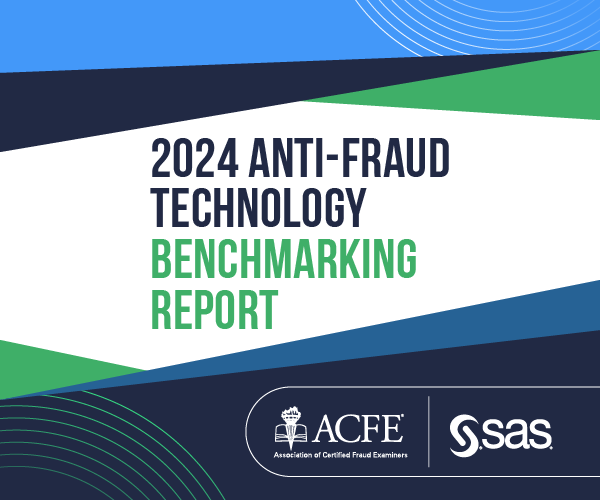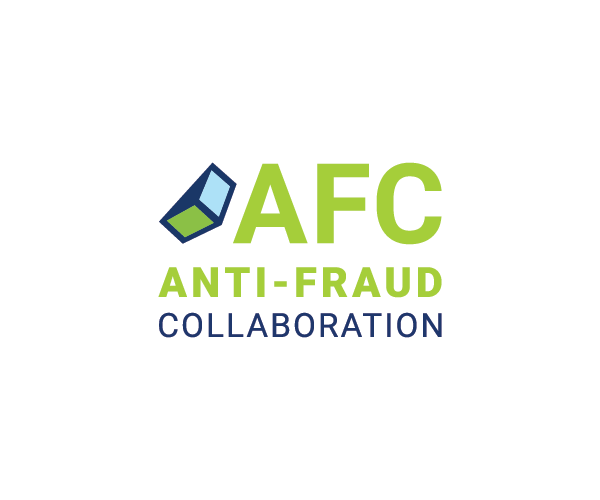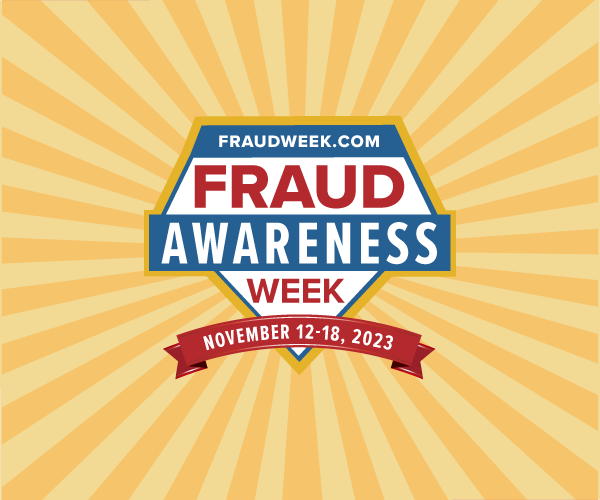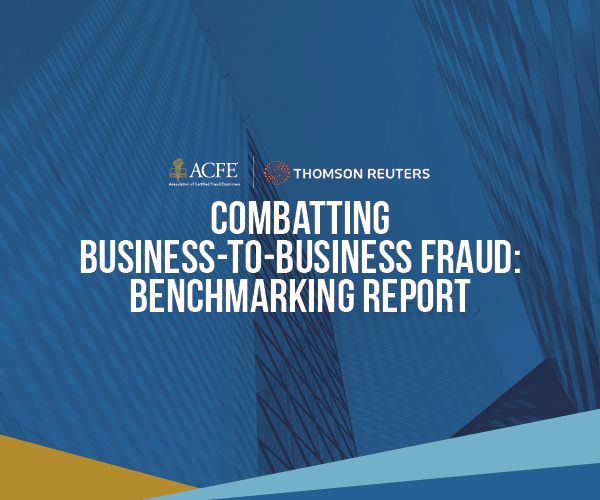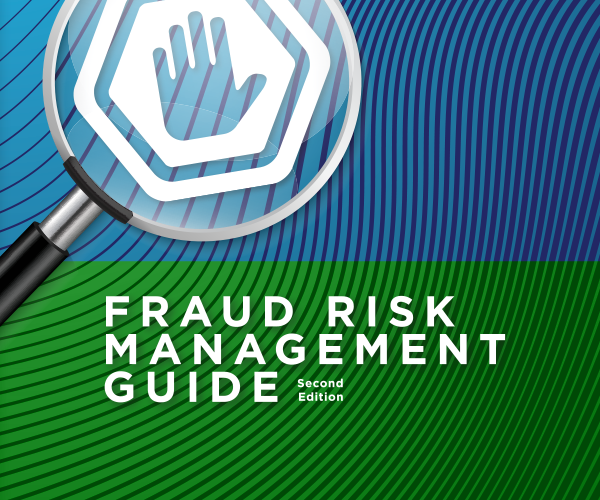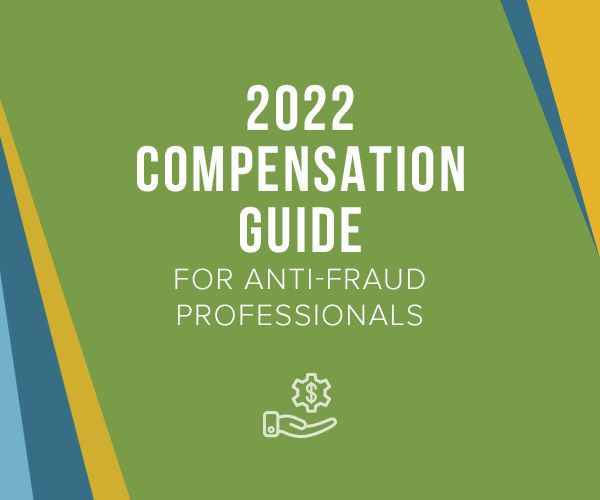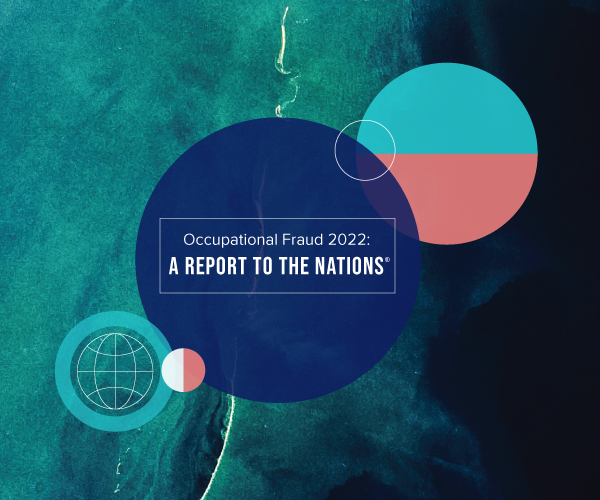More Than 5,400 Anti-Fraud Professionals Attend 36th Annual ACFE Global Fraud Conference
The annual flagship event for the Association of Certified Fraud Examiners (ACFE) was held in Nashville, Tennessee, and virtually.
Results (138)
The ACFE's International Fraud Awareness Week Turns 25
The annual fraud awareness campaign brings organizations, agencies and people together as a united front of fraud fighters.
Nov 03, 2025
AI Neuroscientist, Investigative Journalist to Keynote 2025 ACFE Fraud Conference Canada
The annual anti-fraud event will also welcome an interview and investigations expert and an ethics advocate as keynote speakers.
Oct 03, 2025
Fraud Losses at U.S. Public Companies Focus of New Report
The Impact of Fraud at U.S. Public Companies Benchmarking Report shares insights on all forms of fraud within publicly traded companies in the U.S.
Jul 29, 2025
Malaysia Auditor General Leads Keynote Speakers at 2025 ACFE Fraud Conference Asia-Pacific
The auditor general will keynote the hybrid event as it moves to Malaysia for the first time in the event's more than 15-year history.
Jul 14, 2025
More Than 5,400 Anti-Fraud Professionals Attend 36th Annual ACFE Global Fraud Conference
The annual flagship event for the Association of Certified Fraud Examiners (ACFE) was held in Nashville, Tennessee, and virtually.
Jun 30, 2025
Fraud in the Spotlight at the ACFE's Flagship Event
Speakers at the 36th Annual ACFE Global Fraud Conference will present trending fraud topics including government fraud, AI, cybersecurity and more.
May 28, 2025
COSO Launches Fraud Risk Management Certificate Program
Empowering Professionals to Strengthen Fraud Risk Management
Apr 30, 2025
Global Bodies Sign Deal to Work Together Combatting Business Fraud
The ACFE and ACCA to focus on research and learning in three-year MOU.
Mar 27, 2025
2025 ACFE Fraud Conference Europe to Feature Ex-FIFA Committee Chairman, OCCRP Co-Founder, Hacker Turned CISO and More.
The three-day hybrid event features multiple tracks of educational sessions highlighting the latest trends, tools and techniques for fraud prevention, deterrence and investigation.
Feb 19, 2025
Ex-CIA Agent, Former UK SFO Director to Keynote 2025 ACFE Women's Summit
The fifth annual event will bring together anti-fraud professionals for a day of learning and networking.
Feb 13, 2025
Employee Embezzlement Leads In-House Fraud Team Investigations: ACFE Report
The In-House Fraud Investigation Teams: 2025 Benchmarking Report examines common trends in caseloads, credentials, recovery of fraud losses and more within companies' fraud investigation teams.
Feb 11, 2025
The UAE IAA, ACFE and ISACA Partner for The First Audit, Anti-Fraud & I.T. Congress
The inaugural event, under the patronage of the UAE Ministry of Economy, will gather insightful speakers to guide anti-fraud professionals into a new era of audit, fraud prevention and information technology.
Nov 06, 2024
The ACFE’s International Fraud Awareness Week Connects Organizations Worldwide in Fight Against Fraud
Fortune 500 companies, government agencies, small businesses and more share a collective mission during the week to spread anti-fraud education, tools and resources to their staff and communities.
Nov 04, 2024
U.S. Cyber Command Executive Director to Keynote ACFE Government Anti-Fraud Summit
The ACFE's annual one-day event brings together anti-fraud professionals from government and law enforcement agencies.
Oct 25, 2024
Oct 08, 2024
Gender Pay Gap Decreasing in Anti-Fraud Profession: ACFE Report
The ACFE's 2024 Compensation Guide for Anti-Fraud Professionals, which highlights salary and benefit differences among ACFE members, also shows continued gender diversification in the profession.
Sep 23, 2024
Sep 10, 2024
Cybersecurity, Fintech Experts to Lead 2024 ACFE Fraud Conference Asia-Pacific
This annual conference brings together anti-fraud professionals from across the Asia-Pacific region for three days of discussion on the latest trends, technologies and solutions for detecting and preventing fraud.
Aug 30, 2024
35th Annual ACFE Global Fraud Conference Shatters Previous Attendance Record
The world's largest gathering of anti-fraud professionals drew more than 5,800 attendees from 88 countries to the ARIA Resort and Casino in Las Vegas and online for its 2024 event.
Jul 08, 2024
ACFE Global Fraud Conference Celebrates 35th Year
Whistleblowers, federal fraud fighters, an NFL legend and more will take the stage as keynote speakers at the 35th Annual ACFE Global Fraud Conference.
Jun 06, 2024
ACFE Report to the Nations: Organizations Lost an Average of More Than $1.5M Per Fraud Case
Median losses of the fraud cases analyzed in this year’s report increased 24% compared to the 2022 Report to the Nations. The COVID-19 pandemic might be partly to blame.
Mar 20, 2024
Deepfakes Expert, Pandora Papers Investigative Journalist Among Keynotes at 2024 ACFE Fraud Conference Europe
Feb 29, 2024
Female Fraud Fighters to Convene in Washington for 2024 ACFE Women’s Summit
The fourth annual event explores the challenges unique to women in the anti-fraud industry through idea sharing, exchanging resources and networking with industry leaders.
Feb 23, 2024
UAE Accountability Authority to Host 2024 ACFE Fraud Conference Middle East
The UAE Accountability Authority (UAEAA) partners with the world’s largest organization of anti-fraud professionals to host the premier educational event for fraud fighters in the Middle East.
Feb 19, 2024
Study: 8 in 10 Fraud Fighters Expect to Deploy Generative AI by 2025
Global survey of anti-fraud professionals by the ACFE and SAS reveals incredible GenAI enthusiasm – but past benchmarking studies suggest a more challenging reality.
Feb 13, 2024
The ACFE Joins the Anti-Fraud Collaboration (AFC) in a Strategic Move to Enhance Fraud Prevention and Detection Efforts
Jan 08, 2024
The ACFE Announces International Fraud Awareness Week, November 12–18, 2023
This annual event brings anti-fraud education and awareness to businesses and consumers worldwide.
Oct 30, 2023
ACFE Fraud Conference Canada Returns to Montréal
Keynote speakers for this year's event will include podcaster/tech expert Amber Mac and former Speaker of British Columbia's Legislative Assembly, Dr. Darryl Plecas.
Oct 09, 2023
Formula 1 Data Scientist, AI Entrepreneur Among Keynotes at 2023 ACFE Fraud Conference Asia-Pacific
The three-day hybrid event September 20-22 will bring together anti-fraud professionals in the Asia-Pacific region to discuss emerging fraud trends and technology.
Sep 07, 2023
ACFE, Mission Omega Launch Financial Services Fraud Training Program
The self-paced, online training program will be tailored to banking, financial services institutions and partners.
Aug 31, 2023
ACFE Names New President, Chief Executive Officer
The Association of Certified Fraud Examiners (ACFE) has appointed John Gill, J.D., CFE, as President of the ACFE; John Warren, J.D. CFE, will take over as Chief Executive Officer of the world’s largest anti-fraud organization.
Jul 31, 2023
Synthetic Business Identities Are the Top Risk in Business-to-Business Relationships: Association of Certified Fraud Examiners, Thomson Reuters Report
Half of organizations plan to use more artificial intelligence in their due diligence.
Jun 14, 2023
May 18, 2023
May 02, 2023
UAE Ministry of Finance to Host 2023 ACFE Fraud Conference Middle East
The two-day event will be held in Dubai on 8-9 May, 2023, returning for its eighth annual conference in the region.
Apr 28, 2023
Keynote Speakers Announced for 34th Annual ACFE Global Fraud Conference
The flagship event of the Association of Certified Fraud Examiners (ACFE) will feature U.S. government leaders, industry-leading experts and a notorious fraudster all leading discussions on emerging trends, techniques and perspectives at the world’s largest anti-fraud conference.
Apr 19, 2023
“Tinder Swindler” Hero Among Keynotes at 2023 ACFE Fraud Conference Europe
The online conference, which will be held March 27-29, will also feature more than a dozen educational sessions led by experts across anti-fraud, auditing, cybersecurity and technology industries.
Mar 20, 2023
2023 ACFE Women’s Summit Heads to Washington, D.C. on International Women’s Day
Rachel Wilson, Director of Cybersecurity at Morgan Stanley, and Kelly Donovan, Whistleblower and Advocate, will serve as keynote speakers for the third annual event.
Feb 28, 2023
The Association of Certified Fraud Examiners and The Institute of Internal Auditors Announce Education Partnership
The partnership will elevate competency for fraud investigators and auditors.
Nov 30, 2022
ACFE Fraud Conference Returns to Canada In Person for First Time Since 2019
Following two years of virtual-only events, the 2022 ACFE Fraud Conference Canada brings anti-fraud professionals from around the region back together for three days of educational sessions and networking.
Nov 07, 2022
2022 Government Anti-Fraud Summit Tackles Latest Insights and Challenges Facing Law Enforcement and Government Agencies
This year’s virtual event opens doors for professionals working in law enforcement, government entities and non-governmental organizations (NGOs) to learn specialized knowledge and gather valuable techniques to take on the latest anti-fraud challenges facing the profession.
Oct 31, 2022
ACFE’s 2022 Compensation Guide Highlights Changing Work Environment for Anti-Fraud Professionals in a Post-Pandemic World
The 2022 Compensation Guide for Anti-Fraud Professionals highlights salary trends across the global anti-fraud industry and provides benchmarks in areas such as compensation and job satisfaction to help anti-fraud professionals inform their career decisions.
Oct 04, 2022
2022 ACFE Fraud Conference Asia-Pacific Returns to In-Person Format in Singapore
The 2022 ACFE Fraud Conference Asia-Pacific returns in-person for the first time in three years, with a number of global anti-fraud professionals scheduled to deliver keynote sessions in Singapore.
Sep 26, 2022
ACFE and Grant Thornton Release Guide for Organizations to Manage ESG Fraud Risks
Managing Fraud Risks in an Evolving ESG Environment, a guide to help organizations investing in ESG initiatives avoid fraud, was released in conjunction with the start of the 33rd Annual ACFE Global Fraud Conference, held in Nashville, TN and virtually.
Jun 20, 2022
World’s Largest Conference for Fraud Fighters – The 33rd Annual ACFE Global Fraud Conference – Back in Person for the First Time in Three Years
SEC Director of Enforcement Gurbir Grewal, best-selling author Michael Lewis and others will address attendees at the 33rd Annual ACFE Global Fraud Conference, held in person for the first time in three years.
Jun 09, 2022
Organizations Worldwide Lose Trillions of Dollars to Occupational Fraud
Between 2012 and 2022, fraud cases were caught faster, causing smaller losses according to data in Occupational Fraud 2022: A Report to the Nations. The report, which looked at fraud trends over the past 10 years, also showed that criminal prosecutions of fraud cases were down, while civil cases were up.
Mar 30, 2022
Think Pandemic-Related Fraud Is Going Away? Think Again.
With the widespread distribution of COVID vaccines now promising hope for a “return to normal,” business leaders need to understand that some of the changes in the business landscape are not temporary — and these changes will have a big impact on their organizations’ fraud risk.
Sep 08, 2021
Robert Herjavec, Preet Bharara and More to Speak at Largest Virtual Anti-Fraud Conference This June
Cybersecurity expert Robert Herjavec and former U.S. Attorney of the Southern District of New York Preet Bharara will address 5,000 anti-fraud professionals at the virtual 32nd Annual ACFE Global Fraud Conference on June 21-23.
Jun 03, 2021
New ACFE Report Shows Boards of Directors Are Least Likely to Receive Fraud Training
According to the ACFE’s latest report, the Fraud Awareness Training Benchmarking Report, 14% of respondents said board members receive no fraud training.
Apr 11, 2021
ACFE and Capital Market Authority of Saudi Arabia to Hold Virtual 2021 ACFE Fraud Conference Middle East this April
The Association of Certified Fraud Examiners (ACFE), in collaboration with the Capital Market Authority of Saudi Arabia, will host the 2021 ACFE Fraud Conference Middle East in a virtual format, 7-8 April.
Mar 28, 2021
Cybersecurity Journalist says SolarWinds Hack is a “Harbinger” of Threats to Come
Award-winning journalist, broadcaster and author Misha Glenny says that ransomware should be the top concern of European organizations — and that they’re not prepared.
Mar 01, 2021
Paul Kilby Named New Editor-in-Chief of Fraud Magazine
Paul Kilby, an editor and journalist with more than two decades of experience, will replace Dick Carozza, CFE, who's retiring as the editor-in-chief of the ACFE’s flagship publication Fraud Magazine.
Jan 12, 2021
World Anti-Doping Agency Founder, Former CIO of Canada, Money Laundering Expert and More to Speak at Canadian Anti-Fraud Conference
The founder and former president of the World Anti-Doping Agency (WADA), Dick Pound, has spent decades battling corruption and bribery within the International Olympic Committee.
Oct 15, 2020
Famed Short-Seller Carson Block Warns That Emerging Market-Based Issuers Are “Rife With Fraud”
Carson Block, the founder and chief investment officer of Muddy Waters Capital LLC, made headlines at the beginning of 2020 when he posted a report to Twitter accusing Chinese coffee company Luckin Coffee Inc. of fraudulently inflating sales.
Sep 07, 2020
Whistleblowing, IOT, Health Care Fraud During a Pandemic and More to Be Discussed at Virtual Anti-Fraud Conference
Danske Bank whistleblower Howard Wilkinson, security expert Jules Kroll, WIRED magazine Editor-in-Chief Nicholas Thompson and other experts will address thousands of anti-fraud professionals, June 22-24, at the virtual 31st Annual ACFE Global Fraud Conference.
May 27, 2020
ACFE Report to the Nations: The Average Fraud Costs Companies More Than $1.5 Million
According to a new report from the Association of Certified Fraud Examiners (ACFE), a single case of occupational fraud costs the victim organization an average of more than $1.5 million, and Certified Fraud Examiners (CFEs) estimate that organizations lose 5% of their revenues each year to fraud.
Apr 15, 2020
Coronavirus Pandemic Is a Perfect Storm for Fraud
If you have lived long enough, you have been affected by some unforeseen calamity.
Mar 30, 2020
GDRFA - Dubai and ACFE to Host 2020 ACFE Fraud Conference Middle East on 23 February
Under the patronage of His Highness Sheikh Maktoum bin Mohammed bin Rashid Al Maktoum, Deputy Ruler of Dubai, the General Directorate of Residency and Foreigners Affairs (GDRFA-Dubai) along with the Association of Certified Fraud Examiners (ACFE) will host the 2020 ACFE Fraud Conference Middle East in Dubai 23-25 February.
Feb 13, 2020
Auditor General of Canada, Security Expert, Department of Foreign Affairs Whistleblower and More to Speak at Canadian Anti-Fraud Conference
As technology continues to advance, criminals come up with ways to exploit it just as quickly.
Oct 18, 2018
NAB Whistleblower Says Australian Banking Industry Has “A Long Way to Go” in Promoting Ethical Behavior
The 2018 ACFE Report to the Nations on Occupational Fraud and Abuse showed that the leading detection method for fraud was through tips.
Aug 29, 2018
1MDB Journalist, Academy Award® Winner and More Address World’s Largest Gathering of Fraud Fighters
Academy Award® Winner Bryan Fogel, the director and writer of ICARUS, Clare Rewcastle Brown, the investigative journalist who helped bring the international 1MDB scandal to light and other experts will address more than 3,000 anti-fraud professionals gathering this week for the 29th Annual ACFE Global Fraud Conference.
Jun 17, 2018
ACFE Report to the Nations: Fewer Organizations Referring Fraud to Law Enforcement
Over the past decade, fewer and fewer fraud cases were referred to law enforcement.
Apr 16, 2018
Cybersecurity Expert Warns GDPR Could Create New Extortion Opportunities
Dr. Jessica Barker addressed hundreds of anti-fraud professionals today at the 2018 ACFE Fraud Conference Europe and told them that a new weak point in organizations’ cybersecurity might stem from an unlikely source — General Data Protection Regulation (GDPR) compliance.
Apr 04, 2018
ADAA’s Knowledge Center to become an ACFE Authorized Knowledge Center
The Association of Certified Fraud Examiners (ACFE) and the Abu Dhabi Accountability Authority (ADAA) have joined hands to assert ADAA’s Knowledge Center as an ACFE Authorized Knowledge Center, marking a major milestone in ADAA’s efforts to provide professional advanced training and support to Abu Dhabi government entities and employees.
Feb 24, 2018
World's Largest Anti-Fraud Organization Announces Bruce Dorris, J.D., CFE, CPA, as Incoming President and CEO
The Association of Certified Fraud Examiners (ACFE) announced today that Bruce Dorris, J.D., CFE, CPA, has been named the incoming president and CEO.
Feb 11, 2018
What Drives People to Commit Fraud?: ACFE Releases Two New Videos for Its Annual Fraud Week
In conjunction with their annual International Fraud Awareness Week, November 12-18, 2017, the Association of Certified Fraud Examiners (ACFE) has offered up two videos explaining why people commit fraud, and what common traits fraudsters possess.
Aug 21, 2017
Fraud Examination Teams Looking to Bolster Digital Forensic and Cybersecurity Skills
In the Association of Certified Fraud Examiner’s (ACFE) In-House Fraud Investigation Teams: 2017 Benchmarking Report, fraud investigation teams said the top skills they are currently seeking or expecting to add are digital forensic skills and cybersecurity skills.
Aug 13, 2017
Hundreds of Anti-Fraud Professionals to Discuss Cybersecurity, Whistleblowing and More in Hong Kong
The largest gathering of anti-fraud professionals from the Asia-Pacific region will take place in Hong Kong this autumn at the 2017 ACFE Fraud Conference Asia-Pacific. The conference will be held 17-19 September at the Kowloon Shangri-La Hong Kong, and feature sessions and speeches from leaders in the compliance and cybercrime industry.
Aug 07, 2017
VA Whistleblower Joins Global Anti-Fraud Conference
Dr. Sam Foote, the whistleblower who brought the U.S. Veterans Affairs (VA) scandal to light in 2014, will be awarded the ACFE Sentinel Award at the 28th Annual ACFE Global Fraud Conference in Nashville, June 18-23.
May 29, 2017
Counter Espionage Expert, Former FinCEN Director and Others to Speak at Largest Gathering of Anti-Fraud Professionals This June
Former Director of FinCEN Jennifer Shasky Calvery, investigative journalist Andrew Jennings, former FBI agent Eric O’Neill and other experts will address more than 3,000 anti-fraud professionals gathering for the 28th Annual Association of Certified Fraud Examiners (ACFE) Global Fraud Conference in Nashville, June 18-23.
Apr 19, 2017
How Companies Can Stop Thieves in the Race for Your Tax Return
It's unfortunately common this time of year for individuals to file their taxes only to find out that someone has already claimed their return. This type of identity theft can be upsetting, but it may be even more upsetting if they found out their identity was stolen not through a fault of their own, but due to their employer falling victim to a scam.
Mar 14, 2017
Leah D. Lane, CFE, Named Chairman of ACFE Board of Regents
The Association of Certified Fraud Examiners (ACFE), the world’s largest anti-fraud organization and premier provider of anti-fraud training and education, has announced that Leah D. Lane, CFE, has been named chairman of the 2017-2018 ACFE Board of Regents.
Feb 27, 2017
Investigative Reporter Who Exposed 1MDB to Speak at Anti-Fraud Conference
Famous for her work investigating and exposing the large and complex 1MDB scandal, Clare Rewcastle Brown believes that European banks should be considered partially culpable for the Malaysian-based fraud. Scheduled to address hundreds of anti-fraud professionals in London, 19-21 March, for the 2017 ACFE Fraud Conference Europe, Brown says that international bodies around the world could do more to investigate and prosecute fraud.
Feb 23, 2017
ACFE Saudi Arabia Chapter Releases First Arabic Translation of Globally-Renowned Fraud Report
For the first time since the original report was published in 1996, the ACFE Report to the Nations on Occupational Fraud and Abuse has been translated into Arabic thanks to the efforts of the ACFE Saudi Arabia Chapter, with support from Saudi Aramco.
Dec 15, 2016
The ACFE Hosts Inaugural Law Enforcement Government Anti-Fraud Summit
The Association of Certified Fraud Examiner’s (ACFE) first-ever Law Enforcement Government Anti-Fraud Summit will be November 21 in Washington, D.C., at the Hyatt Regency Washington on Capitol Hill.
Nov 20, 2016
Fraud Week 2016 Brings Fraud Issues to Light Around the World
According to the 2016 ACFE Report to the Nations on Occupational Fraud and Abuse, organizations across the globe lose an average of $150,000 each time they fall victim to fraud and an estimated 5% of their revenues annually.
Nov 13, 2016
Investigative Journalist Who Exposed 1MDB says “We’re Seeing a Swing of the Pendulum” on Worldwide Corruption
“I think this whole offshore financial structure that’s been allowed to grow like a canker … the whole thing’s got out of control,” said investigative journalist Clare Rewcastle Brown in an interview with the Association of Certified Fraud Examiners (ACFE).
Oct 12, 2016
COSO and the ACFE Release Fraud Risk Management Guide
The Committee of Sponsoring Organizations of the Treadway Commission (COSO) announced today the release of the Fraud Risk Management Guide, a new research report that offers a blueprint for helping organizations to establish an overall fraud risk-management program.
Sep 27, 2016
Fraud Report to Be Released at Canada’s Largest Gathering of Anti-Fraud Professionals
According to the Association of Certified Fraud Examiner’s (ACFE) latest report, Canadian fraudsters were more likely to receive no punishment from their employers than being asked to resign.
Aug 07, 2016
Largest Gathering of Fraud Fighters to Hear From Actor Richard Dreyfuss, U.S. District Judge and More
Academy Award-Winning Actor Richard Dreyfuss, Judge Jed S. Rakoff, New York Times investigative journalist David Barboza and other experts will address more than 3,000 anti-fraud professionals gathering for the 27th Annual Association of Certified Fraud Examiners (ACFE) Global Fraud Conference in Las Vegas, June 12-17.
May 17, 2016
ACFE Report to the Nations: Fraud in the federal government costs nearly $200,000 each time it occurs
“Waste, fraud and abuse” has become a pervasive soundbite in the 2016 U.S. presidential election, but just how much fraud is actually occurring in the government?
Mar 29, 2016
Former Member of FIFA’s Independent Governance Committee to Speak at Anti-Fraud Conference
When hundreds of anti-fraud professionals from Europe gather in Brussels on March 20-22 for the 2016 ACFE European Fraud Conference, president and founder of TRACE International, Alexandra Wrage, hopes that she can shed some light on corruption and compliance issues around the world, including those affecting football’s governing body.
Feb 23, 2016
Saudi Aramco Forges Corporate Alliance with Association of Certified Fraud Examiners
The Association of Certified Fraud Examiners (ACFE) have signed a Corporate Alliance agreement with Saudi Aramco which will allow selected Saudi Aramco employees to benefit through full ACFE membership, along with exclusive on-site training opportunities, discounted ACFE conferences and seminars, self-study courses, free quarterly webinars and access to the ACFE network of fraud examiner practitioners.
Feb 12, 2016
The Association of Certified Fraud Examiners Holds First-Ever ACFE Middle East Fraud Conference
More than 300 anti-fraud professionals will gather at Atlantis, the Palm in Dubai on February 14-15, 2016 to discuss emerging issues in fraud prevention and listen to leaders in the anti-fraud field.
Dec 15, 2015
Convicted Enron CFO to Speak at Anti-Fraud Conference
More than 250 anti-fraud professionals from around the Asia-Pacific region will gather for the 2015 Association of Certified Fraud Examiners (ACFE) Asia-Pacific Fraud Conference at Marina Bay Sands in Singapore, November 4-6, to listen to leaders in the anti-fraud field, along with an unlikely special guest: a convicted fraudster.
Sep 17, 2015
Brian Krebs, Leslie Caldwell to Headline ACFE Global Fraud Conference
Cybersecurity expert Brian Krebs, Leslie R. Caldwell, U.S. Department of Justice assistant attorney general, Criminal Division, and other experts will address more than 3,000 anti-fraud professionals gathering here this week for the 26th Annual Association of Certified Fraud Examiners (ACFE) Global Fraud Conference.
Jun 13, 2015
K & N Kenanga Holdings Berhad is the First Southeast Asian Organisation to Partner with Global Anti-Fraud Leader ACFE
K & N Kenanga Holdings Berhad (Kenanga Group), the holding company of the largest independent investment bank in Malaysia*, Kenanga Investment Bank Berhad (KIBB), is the first Southeast Asian organisation to partner with the Association of Certified Fraud Examiners (ACFE), the world’s largest anti-fraud organisation.
Apr 15, 2015
Don’t Lose Your Identity – or Refund – During Tax Season
Your social security number could be the ticket for a fraudster seeking to claim a false tax refund or worse, according to the Internal Revenue Service (IRS). A fraud expert offers some tips for preventing such crime – or at least catching it early.
Feb 26, 2015
Dubai Anti-Fraud Partnership Provides Expert Training, Certification for FAD Employees
The Financial Audit Department (FAD) – Dubai Government announced Thursday a partnership with the Association of Certified Fraud Examiners (ACFE), the world’s largest anti-fraud organization, to provide expert fraud training and certification for FAD employees.
Jan 22, 2015
Hiring Seasonal Staff? Don’t Take Shortcuts, Fraud Experts Say
With seasonal hiring in the U.S. expected to be at its highest level in years, fraud experts warn that companies that loosen their usual processes in order to add staff quickly put themselves at increased risk to fraud.
Nov 05, 2014
Data Breach Expert Selected to Receive ACFE’s Guardian Award
Brian Krebs, the investigative reporter behind KrebsOnSecurity who exposed massive data breaches, cybercriminals and the service providers who catered to them, has been selected to receive the Association of Certified Fraud Examiners (ACFE) Guardian Award.
Oct 30, 2014
ACFE’s Ratley Named One of Accounting Today’s Top 100 for 2014
For the third year in a row, James D. (Jim) Ratley, CFE, president and CEO of the Association of Certified Fraud Examiners (ACFE), has been selected by Accounting Today as “One of the Top 100 Most Influential People.”
Oct 01, 2014
Whistleblower Woodford to Keynote ACFE Fraud Conference in Hong Kong
Woodford will tell his story and reflect on the current state of corruption and fraud in business in his keynote address at the 2014 ACFE Asia-Pacific Fraud Conference, November 16-18, 2014 in Hong Kong.
Sep 30, 2014
Toronto to Host Canada’s Largest Gathering of Fraud Fighters
Hundreds of professional fraud fighters from around Canada will gather next month at Toronto Marriott Downtown Eaton Centre to share best practices in fraud prevention and detection at the 2014 ACFE Canadian Fraud Conference, September 7-10, 2014.
Aug 03, 2014
Louis Freeh, Peter Eigen to Headline ACFE Global Fraud Conference
FBI Director Louis J. Freeh, Transparency International founder Peter Eigen and other experts will address nearly 3,000 anti-fraud professionals gathering here this week for the 25th Annual Association of Certified Fraud Examiners (ACFE) Global Fraud Conference.
May 31, 2014
ACFE Report: Organizations Still Coming Up Short in Fraud Prevention
Organizations around the world lose an estimated 5% of their annual revenues to occupational fraud, according to a survey of Certified Fraud Examiners (CFEs) who investigated cases between January 2012 and December 2013.
May 19, 2014
Dubinsky Named Chairman of ACFE Board of Regents
The Association of Certified Fraud Examiners (ACFE), the world’s largest anti-fraud organization and premier provider of anti-fraud training and education, has announced that Bruce G. Dubinsky, M.S., CFE, CPA, has been named chairman of the ACFE Board of Regents.
Mar 13, 2014
It’s the Season for Giving … And Taking
With increased financial pressure causing fraud to rise an estimated 20% during the U.S. holiday shopping season, the Association of Certified Fraud Examiners (ACFE) reminds business owners and management to take a preventive stance to lower their risk.
Dec 04, 2013
Previously an Overseas Problem, Fraud Comes Ashore in Singapore
Two years after the world’s largest anti-fraud association held its Asia-Pacific Fraud Conference in Singapore for the first time, anti-fraud professionals are preparing to gather again in a country commonly considered a model for keeping fraud and corruption in check.
Oct 30, 2013
ACFE and Airbus Partner for a Proactive Approach on Ethics
The Association of Certified Fraud Examiners (ACFE) has announced a partnership with Airbus to provide ethics and compliance training and certification among its employees.
Oct 02, 2013
Jim Ratley Named One of Top 100 Most Influential People in 2013
For the second year in a row, James D. (Jim) Ratley, CFE, president and CEO of the Association of Certified Fraud Examiners (ACFE), has been selected by Accounting Today as “One of the Top 100 Most Influential People.” The annual list includes business leaders, government figures and luminaries who are “shaping the profession now and in the future.”
Sep 18, 2013
Raiffeisen Bank International Partners with Global Anti-Fraud Leader ACFE
Raiffeisen Bank International AG (RBI), a leading European universal banking group, has announced a partnership with the Association of Certified Fraud Examiners (ACFE) to increase anti-fraud knowledge and certification among its employees.
Sep 01, 2013
Fraud Fighters to Gather in Montreal for ACFE Conference
Hundreds of professional fraud fighters from around Canada will gather Sept. 8-11, 2013 in Montreal to share best practices in fraud prevention and detection at the 2013 Association of Certified Fraud Examiner’s (ACFE) Canadian Fraud Conference. Data analytics, open-source intelligence and new laws and regulations are among the timely fraud training issues on the agenda.
Aug 12, 2013
Wells Receives Internal Auditor 2013 Outstanding Contributor Award
Internal Auditor magazine has announced that Dr. Joseph T. Wells, CFE, CPA, founder and chairman of the Association of Certified Fraud Examiners (ACFE), has been named 2013 Outstanding Contributor for his April 2012 article “Inside the Fraudster's Mind.”
Aug 07, 2013
World’s Largest Gathering of Anti-Fraud Pros Kicks Off in Las Vegas
More than 2,600 anti-fraud professionals have gathered at the ARIA Resort & Casino here for the 24th Annual ACFE Global Fraud Conference, setting record attendance for an event that is the largest of its kind in the world.
Jun 22, 2013
ACFE Honors Journalist Allan Dodds Frank for Exposing Fraud
The Association of Certified Fraud Examiners (ACFE) announced today its selection of Allan Dodds Frank as the recipient of its 2013 Guardian Award, bestowed annually on a journalist whose “determination, perseverance, and commitment to the truth have contributed significantly to the fight against fraud.”
Apr 03, 2013
Brody, Dubinsky Elected to ACFE Board of Regents
The Association of Certified Fraud Examiners (ACFE), the world’s largest anti-fraud organization and premier provider of anti-fraud training and education, has announced that Richard G. Brody, Ph.D., CFE, CPA, and Bruce G. Dubinsky, M.S., CFE, CPA, have been elected to the ACFE Board of Regents.
Jan 10, 2013
“The Street Fighter” Bharara, Enron’s Fastow to Speak at Fraud Conference
Preet Bharara, U.S. Attorney for the Southern District of New York, ex-Enron CFO Andrew Fastow and award-winning actor Stacy Keach head the list of keynote speakers for the 24th Annual Association of Certified Fraud Examiners’ (ACFE) Global Fraud Conference, June 23-28, 2013 at ARIA Resort & Casino in Las Vegas.
Jan 09, 2013
‘Tis the Season – For an Increase in Fraud
Increased financial pressure is the leading reason fraud takes an estimated 20% uptick during the U.S. holiday season, according to a new survey of Certified Fraud Examiners (CFEs). A majority of these experts believe employee embezzlement is the type of fraud most likely to increase during this period.
Dec 18, 2012
Professionals to Gather in Prague in March 2013 for ACFE European Fraud Conference
Red flags of fraud, detecting deception, conducting online investigations and other trending topics will be top discussion items when anti-fraud professionals from across Europe convene on 17-19 March 2013 at the ACFE European Fraud Conference in Prague.
Dec 13, 2012
Hundreds of Fraud Fighters Gather in Ottawa for ACFE Conference
Nearly 250 professional fraud fighters from around Canada arrived at the Ottawa Marriott Sunday to share best practices in fraud prevention and detection at the 2012 ACFE Canadian Fraud Conference. The largest anti-fraud event in the country kicked off with a pre-conference session on conducting internal investigations, and the main conference continues today through Wednesday.
Oct 28, 2012
Fraud Fighters to Gather in Hong Kong for ACFE Conference
Professional fraud fighters from around the Asia-Pacific region will gather for training and to share best practices in fraud prevention and detection at the 2012 ACFE Asia-Pacific Fraud Conference, 4-6 Nov. 2012 in Hong Kong.
Sep 26, 2012
Jim Ratley Named One of Top 100 Most Influential People in 2012
James D. (Jim) Ratley, CFE, president and CEO of the Association of Certified Fraud Examiners (ACFE), has been selected by Accounting Today as One of the Top 100 Most Influential People of 2012. The exclusive list includes President Barack Obama, Mitt Romney, SEC Chair Mary Shapiro and other dignitaries and business leaders.
Sep 12, 2012
Thousands of Fraud Fighters to Arrive Sunday in Orlando
More than 2,300 professional fraud sleuths will arrive here Sunday for the 23rd Annual ACFE Fraud Conference & Exhibition, June 17-22, 2012. The world’s largest gathering of anti-fraud professionals will take place at the Gaylord Palms Resort and Convention Center.
Jun 14, 2012
ACFE Report Estimates Organizations Worldwide Lose 5% of Revenues to Fraud
Organizations around the world lose an estimated 5% of their annual revenues to fraud, according to a survey of Certified Fraud Examiners (CFEs) who investigated cases between January 2010 and December 2011. Applied to the estimated 2011 Gross World Product, this figure translates to a potential total fraud loss of more than $3.5 trillion.
May 09, 2012
ACFE Honors Michael Woodford for Exposing Olympus Accounting Scandal
For “choosing truth over self” in exposing the Olympus accounting scandal, Michael Woodford has been selected to receive the Association of Certified Fraud Examiners’ (ACFE) Cliff Robertson Sentinel Award for 2012.
Feb 29, 2012
Beating Back Fraud: Professionals to Gather in London for ACFE Conference
Anti-fraud professionals from across Europe will convene for training and discussion of the hottest fraud topics in the region when they meet on 25-27 March at the 2012 ACFE European Fraud Conference in London.
Jan 19, 2012
Toronto to host 2011 ACFE Canadian Fraud Conference
The median fraud loss for organizations in Canada is about 127,000 CAD, according to a fraud survey conducted by the Association of Certified Fraud Examiners (ACFE) last year.
Oct 25, 2011
Leading Experts Unite for 2011 ACFE Asia-Pacific Fraud Conference
Anti-fraud professionals will gather in Singapore for expert training and professional networking at the 2011 ACFE Asia-Pacific Fraud Conference, 23-25 October at Marina Bay Sands hotel and resort.
Sep 21, 2011
Breuer Tells Fraud Fighters: Trust Instincts, Don't Be Intimidated
U.S. Attorney General Lanny Breuer was among the distinguished keynote speakers who recognized the fraud-fighting efforts of more than 2,300 professionals in attendance at the 22nd Annual ACFE Fraud Conference and Exhibition.
Jun 14, 2011
Thousands of Fraud Fighters Converge on San Diego
More than 2,300 professional fraud sleuths descended upon the San Diego Convention Center Sunday for the week-long 22nd Annual ACFE Fraud Conference & Exhibition.
Jun 12, 2011
European Organisations' Estimated Median Fraud Loss is World's Worst
The impact of fraud on business in Europe will be on the minds of nearly 150 anti-fraud professionals when they meet at the 2011 ACFE European Fraud Conference next week, 17-19 April 2011, in Brussels.
Apr 12, 2011
Bejarano and Hopewell Elected to ACFE Board of Regents
The Association of Certified Fraud Examiners (ACFE), the world's largest anti-fraud organization and premier provider of anti-fraud training and education, has announced that Johnnie R. Bejarano, DBA, CFE, CPA, and E. Wendell Hopewell, MBA, CFE, CPA, have been elected to the ACFE Board of Regents.
Feb 09, 2011
ACFE President James D. Ratley Honored by Security Magazine
James D. Ratley, CFE, president of the Association of Certified Fraud Examiners (ACFE) has been selected as one of Security magazine's Most Influential Security Executives for 2010.
Dec 07, 2010
ACFE Fraud Conference Features TARP Watchdog, Madoff Trustee
The Association of Certified Fraud Examiners (ACFE) will host its 21st Annual Fraud Conference & Exhibition, July 25-30, 2010 at Gaylord National Hotel in Washington, D.C., headlined by keynote speakers including Special Inspector General Neil M. Barofsky, overseer of the Troubled Asset Relief Program (TARP), and court-appointed Madoff trustee Irving Picard.
Jul 25, 2010
ACFE Report Estimates Organizations Worldwide Lose 5% of Revenues to Fraud
Organizations around the world lose an estimated 5% of their annual revenues to fraud, according to a survey of Certified Fraud Examiners (CFEs) who investigated cases between January 2008 and December 2009.
Jun 01, 2010
The ACFE Warns Against Changing Sarbanes-Oxley Rules
A measure approved last week by the House Financial Services Committee to change Sarbanes-Oxley audit rules would lead to a higher incidence of fraud and an increase in the amount of fraud losses, according to the Association of Certified Fraud Examiners (ACFE).
Nov 10, 2009
IRS Criminal Investigation Division Joins ACFE Law Enforcement Partnership
The Criminal Investigation Division of the Internal Revenue Service (IRS-CI) recently joined the ACFE Law Enforcement Partnership by officially recognizing the Certified Fraud Examiner (CFE) credential for hiring and promotional purposes.
Oct 29, 2009
Pamela Davis Announced as Recipient of ACFE Sentinel Award
The Association of Certified Fraud Examiners (ACFE) presented its annual Cliff Robertson Sentinel Award Wednesday to Pamela Davis, CEO of Edward Hospital in near Chicago, at the 20th Annual ACFE Fraud Conference & Exhibition in Las Vegas.
Jul 14, 2009
More than 2,000 Fraud Fighters to Gather this Week in Las Vegas
The ACFE is hosting its 20th Annual Fraud Conference & Exhibition in Las Vegas, where more than 2,000 attendees will hear keynote speakers including Madoff whistleblower Harry Markopolos, CFE, CFA and second U.S. Secretary of Homeland Security Michael Chertoff at the largest gathering of anti-fraud professionals in the world.
Jul 09, 2009
$65 Billion Stolen by Madoff? Not Hardly
Well-meaning victims, courts, the media and the public actually believe that Bernard Madoff, sentenced recently to a record 150 years in prison, stole 65 billion dollars. Not hardly — not even close.
Jul 01, 2009
ACFE Survey of Experts Finds Increase in Fraud During Economic Crisis
Intense financial pressure during the economic crisis has led to an increase of fraud, according to a survey of fraud experts conducted by the Association of Certified Fraud Examiners (ACFE).
Apr 15, 2009
Certified Fraud Examiner Markopolos is Madoff Whistleblower
Documented allegations of fraud against Madoff Investment Securities, LLC were presented to the Securities Exchange Commission as early as 1999 by Harry Markopolos, a Certified Fraud Examiner.
Dec 17, 2008
Office of the Inspector General for the National Reconnaissance Office Officially Recognizes CFE Credential
The Office of the Inspector General (OIG) for the National Reconnaissance Office (NRO) recently announced its official recognition of the Certified Fraud Examiner (CFE) credential for hiring and promotional purposes.
Jul 27, 2008
New Report Estimates U.S. Organizations Lose 7% of Revenues to Fraud
U.S. organizations lose an estimated seven percent of their annual revenues to fraud, according to a survey of Certified Fraud Examiners who investigated cases between January 2006 and February 2008.
Jul 13, 2008
More Than 2,000 Fraud Fighters to Gather This Week in Boston
The Association of Certified Fraud Examiners (ACFE) will be hosting its 19th Annual Fraud Conference & Exhibition on July 13-18, 2008 in Boston, featuring an opening keynote address by Senator George Mitchell.
Jul 11, 2008
The Office of the Inspector General for the U.S. Department of the Interior Officially Recognizes the CFE Credential
The Office of the Inspector General (OIG) for the U.S. Department of the Interior (DOI) recently recognized the Certified Fraud Examiner (CFE) credential for hiring and promotional purposes.
May 28, 2008
Dismissal of Texas Supreme Court Justice’s Indictment Raises Questions
A case involving Texas Supreme Court Justice David Medina, a Harris County Grand Jury, and the Harris County District Attorney is raising a debate as to whether politics or a lack of evidence played a role in the dismissal of indictments.





















